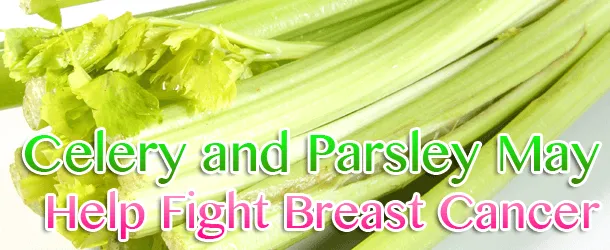
- Share on Facebook3
- Share on Pinterest
- Share on Twitter
In the push to find a cure for breast cancer, researchers are casting their nets wider in looking at plant substances for chemicals that may provide treatment answers. At the University of Missouri, researchers are looking at chemical compounds find in celery and parsley and finding promising results.
Hormones, Breast Cancer and Salad Greens
Many women are given the hormone progesterone as part of hormone replacement therapy (HRT) during menopausal years. In the past, women were given progesterone and estrogen for years and years beyond the end of menopause because doctors thought that it posed no health risk. However, research in the past decade has suggested that long term HRT increases the risk for breast cancer and other serious health problems.
Researchers discovered that the chemical apigenin, which is found in celery and parsley, slows down the growth of breast cancer tumors. It stops breast cancer cells from growing, it causes cancer cell death and it slows down the impact of one of the genes associated with cancer growth. Another finding was that apigenin starved cancer tumors by narrowing blood vessels feeding the tumors.
These findings provide hope that new treatment modalities can be developed using natural chemicals found in foods and plants, rather than turning to chemotherapy or radiation to treat breast cancer. While many women prefer to undergo short term HRT to address uncomfortable symptoms of menopause, women who have a family history of breast cancer are discouraged from using HRT because of the increased risk of developing the illness.
– The Alternative Daily
- Share on Facebook3
- Share on Pinterest
- Share on Twitter

